- Home
- Beverley Harper
Storms Over Africa Page 2
Storms Over Africa Read online
Page 2
ONE
The departure lounge at Harare International Airport was chaotic, a ceaseless flow of sweating bodies. Harried airport officials vied for floor space alongside passengers trying to check their baggage onto the London flight. Family and friends saying farewell further clogged the limited space. Some people had spilled into the Arrivals hall in order to say goodbye but, because the London flight came in, changed crew and turned around for the return journey within ninety minutes, this lounge was starting to fill with people there to meet the incoming flight. As always, the imminent arrival of an overseas flight had drawn a large crowd of sightseers who mingled aimlessly in the already packed airport, getting in everyone’s way. For these people, the closest they could come to an aeroplane flight was being in the airport when the big planes arrived and they treated this event as a great source of entertainment.
In the seething mass one man managed to stand aloof. He was at the back of the crowd, half turned from the wall, leaning against it with his left shoulder, one leg tucked comfortably in front of the other. His left hand was placed loosely in the pocket of his jacket, four fingers inside and the thumb outside. He held a cigarette between thumb and index finger of his right hand and took slow, appreciative puffs, blowing the smoke upwards with leisurely enjoyment. His hat, a faded and dusty slouch made from kudu skin, was pulled down so the brim was just level with his eyes. His trousers, shirt and jacket were khaki drill, softened by wear and many washings.
Richard Dunn took a last drag on his cigarette before flicking it casually towards the sand filled metal ashtray about two metres from where he stood. He nodded with satisfaction when the stub landed perfectly in the centre of the vessel.
By tilting his head back slightly he was able to observe the tide of humanity as it ebbed and flowed around him. When he lowered his head he could shut it out, closing his mind to its noise as easily as he excommunicated the sight of it. The brim of his hat was his shutter, opening and closing with the merest movement of his head. He liked the control it gave him.
He glanced up briefly at the clock over the exit door. Richard never wore a watch. A watch dulled his ability to tell the time by the position of the sun. Unless he was indoors, his calculations were never more than five minutes out. Looking at the clock he was irritated to see that David’s flight was already ten minutes late, despite the display on the Arrivals screen stating it was on time.
An Air Zimbabwe ground hostess spotted him, smiled and waved. When she received no acknowledgement she shrugged and went about her business. She knew she had not been snubbed. He simply had not seen her. She glanced in Richard’s direction every few minutes, hoping to catch his attention. From experience, she knew that those eyes, now shielded by his hat, could flare with carnal desire. The memory sent a shiver through her.
She wondered, not for the first time, how old he was. High cheekbones and a fine straight nose had his skin stretched taut over his cheeks. Tiny lines around his eyes and mouth added character. Thick black eyebrows and a black moustache settled comfortably against the deep tan of his skin. His black hair was thick and curly, tinged ever so slightly with grey flecks. He was in good physical shape, his hard flat stomach showing no sign of his love of good food and imported scotch. The ground hostess decided he looked to be in his middle forties, although she knew he had the stamina of a much younger man.
Unaware of this scrutiny, Richard was thinking about last night’s disaster, the most recent in a long line of calamitous family events. As usual, it left him wondering if his life might have been better had he never met Kathy, his wife of nineteen years. She had died five years ago, leaving him to bring up a headstrong, wild and spoiled daughter of seventeen and a shy and gentle son of twelve. On those few occasions he remembered his wife without aching empty loneliness, Richard was tempted to believe that Kathy had died just to spite him.
Absently, he ran his fingers over his moustache which he had grown to hide a scar. He grinned when he remembered the incident. Kathy, her beautiful blue eyes still filmy with sleep, her long blonde hair in disarray, flowing in glorious golden abandon over her shoulders, her thin nightdress not doing much to hide the soft, feminine lines of her body. She stood, hands on hips, glaring at her husband who was swaying and grinning at her in drunken happiness.
‘Hello, my beautiful heart, my beloved darling.’ The alcohol had given free rein to the rather poor romantic in him. ‘You are looking very fetching this morning, my love.’
Kathy snorted.
‘What are you doing up at this hour, love of my life?’ He took a stumbling step towards her.
Kathy backed up. She didn’t look much like the loving and gentle girl he had married.
‘And just where the hell have you been all night?’ Her anger hardened the normal soft burr of her Edinburgh accent. ‘Who’s the lucky girl this time?’
‘Ah now Kathy, darling . . .’
He tried to tell her it was a night out with the boys, a bit of harmless boisterousness kicking up their heels in Harare, but he was in no shape to explain and he felt his eyes refusing to meet the hostile glare of his wife.
Several planks of wood were leaning against the wall of the house. If Richard had been able to meet his wife’s eyes he might have seen the plank she swung at him coming. He was knocked out cold.
When he came round he thought he was drowning in a sea of red grass. It took him some moments to realise that Kathy was holding him, her hair streaming over his face, its redness the result of his blood which sprayed from the gash in his mouth. She was crying and begging his forgiveness.
Amusement, anger and protestations of innocence all strived for supremacy within him. Desire triumphed over everything. Ignoring the pain of a lip cut through and several loose teeth, and despite Kathy’s protests of, ‘but Richard, the servants’, Richard Dunn made love to her on the bare boards of the verandah, the dawn chorus of wood doves—piet-my-vrou, grey loerie and weaverbirds—drowned out by the soft love cries of his wife.
The memory of Kathy disturbed him. The knowledge that he had often hurt her had caused pangs of regret while she was alive but, after her death, he wished that more than anything else he had been more considerate, shown more affection. Kathy had known other women were attracted to her husband. She’d believed that his occasional forays into the hotels of Harare, usually after attending the cattle sales and in the company of other farmers, involved women. And it was true, other women had been involved but not in the way his wife thought. Richard had gone to cut loose, to relax and get away from the daily toil of farming. To get a little drunk with other farmers—male and female—he only saw once or twice a year. To swap stories, experiences, triumphs and failures. To be in the company of someone other than his own family.
Kathy had done the same. She had friends in Harare who she saw whenever she went down to the capital. Friends who would talk about babies and recipes and clothes. She needed that outside contact too. But Kathy did not come home drunk from the bars at six in the morning. She did not consider herself to be fatally attractive to members of the opposite sex. She loved her husband wholly and deeply.
Richard had loved his wife wholly and deeply too, if a little haphazardly. Her death from cancer had been a desperately cruel blow. Typically, when he thought about his marriage, he remembered his thoughtlessness, selfishness—wishing he had been a better husband. He never stopped to consider how much he had helped her. Kathy had needed him badly. In the beginning, while she was undergoing radiotherapy and chemotherapy, she was often weak and tired, forever sick, sometimes depressed. He was there at her side, supporting, humouring and helping. When ulcers turned her mouth into ugly red sores, he would kiss her ears and tell her how much he loved her and supervise soft food she could swallow easily. When, after six months of treatment, she began to hold her own, he was there, encouraging her to be positive.
And when, after a year of remission, the cancer began to spread, he tried everything he knew to get her to agree to go ba
ck for more treatment.
‘No more,’ she had begged him. ‘I can’t go through it again.’
He had bullied, ranted and pleaded in return.
‘But it won’t make any difference if I do or don’t, the end result will be the same. Please stop shouting at me.’
Privately, her doctor agreed. ‘I’m sorry, Richard. Kathy knows the truth. Just be there for her.’
And he had been. But he had forgotten.
It took her four years. Four years while the cancer played a stop-start game. But it never went backwards, only forwards. It never got better. At times Richard was impatient, had horrible and disloyal thoughts, felt sorry for himself, felt angry with Kathy.
At her funeral the doctor said to him, ‘Lose your guilt, Richard, you did everything you possibly could.’
‘How the hell would you know?’ he had snarled back, angry, frightened, alone and feeling ill equipped to help his children. ‘There were times I wished she would hurry up and get on with it.’
‘That’s only natural.’
But he did not believe the doctor and he constantly berated himself. He missed her more than he would have believed possible. He missed her gentle humour, her companionship and her unwavering love and loyalty. Her death forced him to acknowledge the depth of his own love for her, something he had taken for granted. And while he was sunk into bitter regret for not loving her better, while he thrashed around in loneliness and pain, his farm went steadily downhill.
His thoughts shifted back to the previous night. It had started well enough. He planned to have dinner with his daughter at Henri’s. He had telephoned her as soon as he checked into his room at Harare’s best hotel. The sound of her crisp, self-assured voice filled him with a swelling of paternal pride which always surprised him.
‘Penny Dunn.’
‘Hello, baby.’
‘Daddy!’ Her voice rose with pleasure. ‘Where are you?’
‘Meikles.’
‘Why don’t you stay with me?’
It was an old question. He gave his usual answer. ‘I don’t want to impose on you, baby.’ In truth, the one occasion he had stayed with Penny the lumpy mattress of her spare bed gave him a backache, the modern art paintings that hung all over her flat depressed him, and watching her act as hostess filled him with the dreadful suspicion he was growing old.
‘What brings you down to the big city?’
‘David’s arriving tomorrow.’
‘Oh.’ Penny fell silent. She and her brother had practically nothing in common. Richard suspected they never corresponded while David was in his boarding school in Scotland.
‘Like to have dinner with an old man tonight?’
‘Daddy, I’d love to.’
‘Fine, I’ll pick you up around 7.30.’
On his way through the hotel lobby he heard his name called. Turning, he saw a tall redhead striding towards him. She looked vaguely familiar. ‘Hello,’ he greeted her cautiously.
‘Richard, what a surprise. I’m overnighting here. Flying to Sydney tomorrow. How lovely to see you again.’
Richard’s mind was in overdrive. Australian from the accent—air hostess most likely. He still could not remember her name. ‘Great to see you too,’ he responded, getting a brief flashback of pale, finely freckled skin on limbs entangled enticingly in lime green sheets. Now where in the name of God have I slept in lime green sheets?
‘You don’t remember me, do you?’ Her lovely full mouth pouted attractively.
To buy time he replied, ‘Of course I do. And I’ll never forget those sheets.’
To his relief she threw back her head and laughed. ‘God, yes. Sue and her bloody awful sheets.’
Sue! Ah yes—Susie Stace, temporary Qantas representative in Harare, filling in for the regular manager who was recovering from recurring malaria. ‘Great night wasn’t it?’ If only I could bloody-well remember it. He adlibbed desperately, hoping his memory, which was two seconds ahead of his mouth, would come to his aid. She’s got a sugary name. ‘Candy . . . of course I remember you.’
‘Close.’ She grinned at him. ‘Candice, actually.’
Suddenly he liked her. She had an openness which appealed to him. ‘I’m having dinner with my daughter. Care to join us?’ As soon as the words were out he regretted them. Penny would not be pleased to share her evening with another woman. She was jealously possessive of private time with her father.
The evening was a disaster. Penny was moody and brittle, rude to Candice and sarcastic to Richard. Candice, sensing the tension between father and daughter, became embarrassed and silent. Richard overcompensated and tried to be funny. He knew this was a mistake, but was unable to stop himself. Eventually, over coffee, Penny excused herself, claiming she had an early start the next day and needed to get home. ‘I’ll take a taxi,’ she told Richard, ‘I don’t want to spoil your evening.’ She said a curt goodnight to Candice and left them.
‘I don’t think your daughter likes me.’
‘My daughter,’ Richard responded heavily, ‘doesn’t like any woman in my company. What my daughter needs is a bloody good spanking.’
‘Bit late for that,’ Candice said with brutal Australian honesty. Then she reached out for Richard’s hand. ‘To hell with her. She’s not going to spoil my evening.’ And Richard, feeling he was somehow betraying his daughter but too irritated with her to do anything about it, had agreed.
Leaning against the wall at the airport, Richard wondered about Penny’s attitude. She had always been possessive and wilful. Spoiling her after her mother’s death had only made her worse. He was not blind to her faults but he loved her with the myopia of a parent and he made allowances for her. It was hard not to; she was a feminine replica of her father, right down to thick black hair and dark, winged eyebrows. It had always charmed him to watch her, fascinated him to observe the way her personality developed so closely aligned with his that sometimes they could communicate without speaking.
His thoughts were interrupted by the announcement of the arrival of the London flight. The prospect of seeing David after three months gave Richard mixed feelings. Where Penny was wild and spoiled, competent and hard, David was soft, gentle, generous to a fault, sensitive and, to Richard’s way of thinking, a bit girlish. The boy was seventeen, his voice had broken several years earlier, and he had the hard muscular body of a young man. Yet, last school holidays, David had cried like a baby over the death of his dog. Richard saw David’s sensitivity as a sign of weakness, never connecting it to Kathy’s gentle nature.
He knew that, more than Penny, David had suffered through the loss of their mother. Kathy had always been the buffer zone between David and the harder personalities of Richard and Penny. When she died, David had retreated into a silent and terrible mourning which no-one seemed able to penetrate. Although on the surface he appeared to be coping, Richard knew he was not, but was unable to help his son. David’s grief made Richard feel guilty, which annoyed him. He took his irritation out on his son. He knew he was being irrational but David’s gentle sensitivity acted like salt on a snail’s tail—it had Richard fizzing with impatience.
He delved into his pocket and took out his cigarettes, shaking his head at the complexities of being a single parent. He knew he was ill equipped for the role. If Kathy were still alive he felt certain his two children would have turned out differently. Even if they hadn’t, at least she would have been there to shoulder some of the responsibility. That was the rub. He believed himself to be too impatient to be a good father. He never acknowledged, even to himself, that the responsibility scared him. ‘Damn it, Kath,’ he thought, not for the first time, ‘why the hell did you go and leave like that?’
As usual, thinking about Kathy reminded him of the night she died. He hated to remember that night but the memories often came, unbidden, and because he had loved her more than he would ever love another woman, he never chased them away. Even bad memories brought her back, however briefly.
The doctor,
on a regular visit, confirmed what Richard already knew. Kathy was losing the battle. ‘She should be in hospital.’
But he had promised her he wouldn’t send her away. He had learned how to inject the morphine she needed, dealt personally with the soiled nightdresses and bedclothes because he knew she would be embarrassed to have a nurse do it, and supervised the cooking of her food and spent hours enticing her to eat. ‘She stays at home,’ he told the doctor.
‘Then I’d send for the children if I were you, Richard. She’s only got a few days.’
Penny and David arrived home from boarding school two weeks before term officially finished. Penny—coltish, skittish, a young woman one minute, a young girl the next—was tight-lipped and defiant, almost challenging God for the ownership of her mother. David, a quiet man in a child’s body, was white-faced and frightened and terribly vulnerable. The day they arrived was a bad one for Kathy but the next day she saw her children one at a time. Each of them spent several hours with her. It was as though she had been hanging on to say goodbye. That night she died while Richard held her frail body in his arms, the breath leaving her in one small sigh. Her last whispered words to her husband were, ‘Go and sit in the chair, darling. You’re holding me back.’ But Richard could not let her go and he held her desperately, willing her to stay, tears soaking her nightdress, sobs shaking his body as he faced the reality of her leaving him and he knew with absolute certainty how much he loved her.
After the funeral, feeling more alone than he had ever felt and hungry for anything of Kathy’s which might bring her closer, he asked his children what they had spoken about with their mother on that last occasion. Penny carefully recounted the conversation, drawing strength from sharing with her father. David defied him. ‘That’s between her and me, Dad.’
Richard’s patience had been on a short leash. ‘Damn it, David, I need to know.’ But David, twelve years old, deeply in shock and bereft beyond belief, took comfort his own way, by hugging the last few hours with his mother to himself.

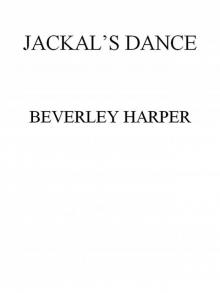 Jackal's Dance
Jackal's Dance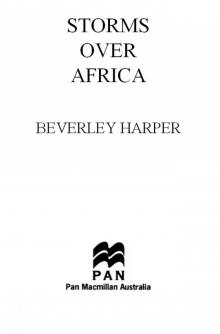 Storms Over Africa
Storms Over Africa Edge of the Rain
Edge of the Rain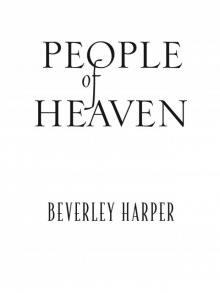 People of Heaven
People of Heaven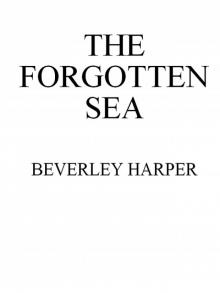 The Forgotten Sea
The Forgotten Sea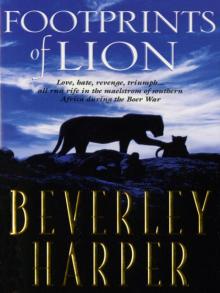 Footprints of Lion
Footprints of Lion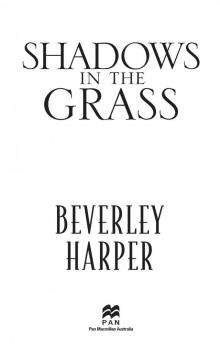 Shadows in the Grass
Shadows in the Grass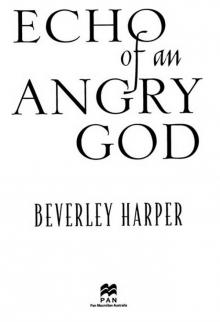 Echo of an Angry God
Echo of an Angry God